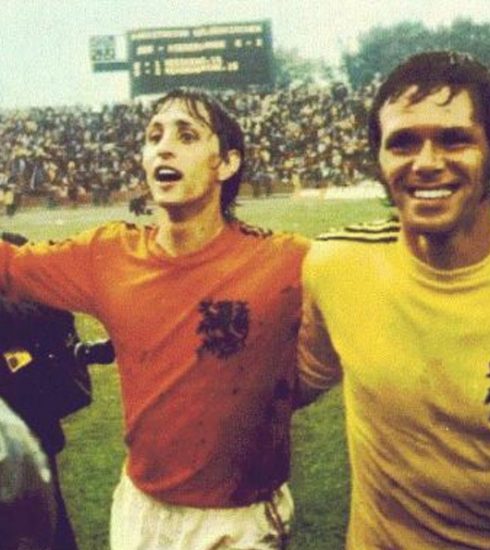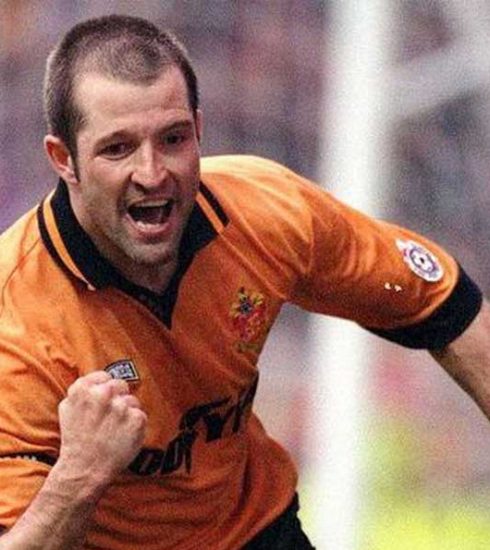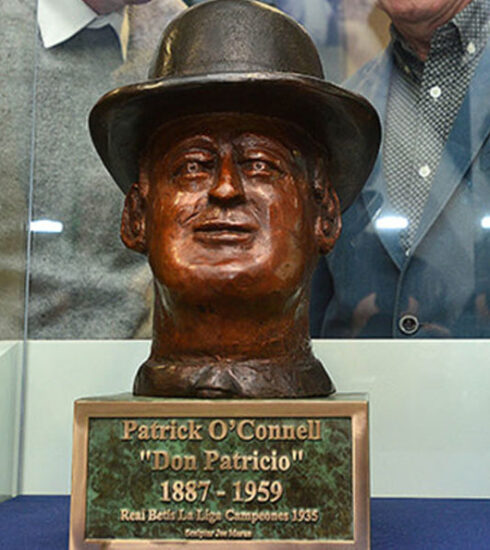DAVID KIPIANI: The forgotten hero



13 May 1981.
The day that every single inhabitant of Georgia, and of Tbilisi in particular, remembers perfectly. Being born after that day in Georgia, and in Tbilisi in particular, is considered little less than a misfortune.
“You weren’t there in May 1981!” is the most recurrent phrase towards all subsequent generations.
13 May 1981 is the day when the whole of Georgia came to a standstill.
It is a bit like asking an Italian where he was on 11 July the following year or a Dane where he was on 26 June 1992.
Easy … in front of the TV watching the ‘football match of a lifetime’.
I gave two examples of national football teams from their own countries.
Well, someone will object, but Dinamo Tbilisi is a club team, not a national team.
Wrong.
Dinamo Tbilisi was the team that represented the NATION Georgia in the days of the Union of Soviet Socialist Republics.
That night in Tbilisi, even in the police records, there seems to have been no report of a break-in. No robberies, no fights, no pickpocketing.
The whole of Georgia was in front of the TV.
That evening Dinamo was playing the final of the beautiful and, alas, defunct Cup Winners’ Cup.
In front of them was certainly not one of the greats of European football, but a team from a small German city, also on the other side of the Berlin Wall.
In fact, it was little more than 200 kilometres from the wall since the team in question was the Karl Zeiss Jena, and Jena is in Thuringia, in what was then East Germany.
There is one problem, however, and not a small one.
The final is played ‘over the wall’ and exactly in Dusseldorf, in the other Germany, the West Germany.
The five thousand scanty (and mostly local) fans in the stands of the Rheinstadion certainly do not contribute to an unforgettable atmosphere.
The division still in place between the two ‘Europes’ makes it virtually impossible for Dinamo fans to travel to German soil … even if it is the match ‘of a lifetime’.
The fans arriving from Tbilisi are about a hundred … maybe even less.
It matters little.
Both teams did not have an easy path to the final.
Already in the first round, Karl Zeis Jena performed a feat, or rather ‘the feat’ as the older fans of this glorious club, which fell into disgrace after the reunification of the Germanies, still like to remember it.
In the first round, in fact, for the Germans from Jena there was Roma, who won at the Stadio Olimpico with a net 3-0. Pruzzo, Ancelotti and Falcao the scorers. Everything seemed closed and settled. But in the return match Karl Zeiss threw their hearts over the hurdle, playing with a determination and grit that completely disconcerted the Giallorossi, who were convinced they were going on a trip to that small town in the middle of nowhere.
The Karl Zeiss Jena team won 4 goals to 0, twice hitting the goalposts of Tancredi, who saved his team from an even worse collapse with some top-class interventions.
After Roma, it was Valencia (defending champions), the revelation Newport County and Benfica that fell under the blows of the German whites.
Dinamo, on the other hand, after two relatively easy rounds against the Greeks of Kastoria and the Irish of Waterford, accomplished a feat in the quarter-finals by eliminating the English team of West Ham. The 4-1 victory over Brooking and Co. is still remembered as one of the most spectacular performances by a foreign team on British soil.
The Guardian wrote that ‘Dinamo Tbilisi made a generation fall in love with their wonderful football’.
In the semi-finals it will be the Dutch Feyenoord who will fall, defeated 3 – 0 in Tbilisi and ‘contained’ with a 0 – 2 at De Kuip.
Tonight there is a chance to make history.
Of Russian football, which before Dimano Tbilisi had only seen Oleg Blokhin’s Dynamo Kiev and comrades lift the same continental trophy six seasons, but above all of Georgian football, which has never had a club of its own come so high.
National TV, strictly in black and white, will broadcast the match.
Right from the start, however, it is clear that we are facing something special.
Dimano Tbilisi does not look like a Russian team at all.
Dynamo Kiev and the national team had always achieved their best results thanks to a methodical organisation of play, great physical strength and a pragmatic, no-nonsense philosophy.
Dynamo is the exact opposite.
Technique, imagination, creativity and plenty of room for individual play by its most gifted players.
Certainly not what you would expect from a Russian team.
‘Simple’ the Dinamo players would answer in chorus ‘We are Georgians, not Russians!
From the very first minutes there is one footballer who attracts the attention of almost everyone watching the match.
Initially because of his physical appearance, so peculiar that it makes him look more like a desk clerk than a footballer.
Tall, thin and angular.
With a significant baldness and two black moustaches under two pronounced cheekbones.
But it is when he touches the ball that you realise that David Kipiani IS NOT a normal player.
Meanwhile, he is the absolute leader of the team.
There seems to be an unwritten law that every ball of every offensive action must pass from his feet.
It seems, however, that even the Karl Zeiss Jena players know this!
Every time Kipiani comes into possession of the ball, there are a couple of German footballers who immediately bite his ankles and, true to the old motto ‘it’s either leg or ball’, try to limit the number 10 in the blue suit as much as possible.
Theoretically he is a striker, at least that is how he is presented in the starting line-up.
In reality he is one of those players à la Di Stefano, à la Cruyff, à la Tostao or à la Deyna, so intelligent and ductile that they seem to ‘feel’ in which position they can hurt the opponent most.
Those players to whom the gods, in addition to talent, have also bestowed a thinking brain.
And so Kipiani starts to drop back, floating, as we would say today, ‘between the lines’.
Too far back to be marked by a stopper and too far forward to ‘waste’ a midfielder in his marking.
The first half flows by frantically, fought and sweated.
But played little.
Dinamo Tbilisi likes to be masters of the game and the Georgians almost always have the ball.
But Karl Zeiss did not give an inch, closed the spaces and tried to hurt, especially with the wings Vogel and Bielau.
In the second half, after less than twenty minutes, what seemed to be the turning point of the match.
There was a beautiful throw-in action by the Germans with the ball that Vogel, after a beautiful triangulation with Lindemann, arrived on the back line before putting in a cross in the middle on which the Dinamo Tbilisi defence seemed uncertain.
From behind, Hoppe, the centre-back, arrived and, with a beautiful right-footed volley, slotted the ball under the crossbar of a stunned Gabelia.
It was Séngelia who went on the offensive, jumping over a couple of opponents before “offloading” in basketball style on the right to the onrushing Gutsaev. A great first-time shot and the ball into the net.
Not even four minutes had passed since the German lead.
Dinamo Tbilisi became the masters of the field and ‘Dato’ (this is his nickname throughout Georgia) took over, distributing balls and acting as the catalyst of the game.
The slender ‘director-referee-striker’ of Dinamo has a peculiar characteristic, common to all great footballers: he dictates the timing of the game.
Less than four minutes to go.
The game seems destined for extra time when Kipiani receives the ball in the opponent’s three-quarter. This time he almost seems to be basking with the ball between his feet, giving the idea that he wants to cheat time (and the Karl Zeiss) while waiting for extra time.
Then, again with great indolence, he decides to ‘offload’ the ball to his Vit’ali team-mate Daraselia, another immense player and Kipiani’s perfect alter ego: burly, bursting with run and muscle but with more than polite feet.
Daraselia is not particularly ‘thinking’.
He makes no calculations and rushes towards the opponent’s goal.
There are a good thirty metres between him and Grapenthin, the German number one.
Daraselia skipped past a first opponent at speed, returned to the centre of the area, faked a right-footed shot by making the opponent sit down and then with his left he unloaded a low shot that went in at the edge of the post.
For the East Germans, there is no more time.
Dinamo Tbilisi won what was then the 2nd most important continental trophy.
The first (and last) for the Georgian region, which would become a nation in its own right exactly ten years later.
The whole of Georgia went mad.
Millions of Georgians take to the streets. Almost a hundred thousand of them gather at the Dinamo stadium, then named after Vladimir Lenin.
For David Kipiani, it is the ultimate consecration.
There are many teams of blazon who want him in Europe beyond the wall.
“Dato’ does not waver for a moment.
He is Georgian, and in Tbilisi he wants to stay his whole career … and his whole life.
Beyond the wall he goes there a few months later, for a summer tournament, the one organised at the Santiago Bernabeu in Madrid and named after the former great Real president of Puskas, Gento and Di Stefano.
Dinamo Tbilisi are playing against the hosts Real Madrid when an absurd entrance by Madrid midfielder Angel leaves Kipiani on the ground with a broken leg.
It is September 1981.
The USSR failed to qualify for the 1978 World Cup in Argentina, but this time qualification for the 1982 World Cup in Spain is practically a done deal.
For Kipiani, it is the chance he has been waiting for.
To be able to show the world his skills on the most important stage of all.
He will be almost 31 years old, so it will probably also be his last opportunity at this level.
They are long months of recovery, rehabilitation, but when he resumes playing in the spring of 1982 everything seems to be all right.
Kipiani has resumed playing for Dinamo Tbilisi and takes over the team just in time for the decisive stages of the season. There is a Cup Winners’ Cup to defend and Kipiani is the protagonist in the quarter-final victory over Legia Warsaw before bowing out in the semi-final to Belgium’s Standard Liege.
But there is a problem, as unexpected as it is insurmountable.
The bench of the Russian national team, in a brainless and ineffective decision by the Federation, is assigned to three coaches, who must represent the three major ‘schools’ of the Soviet socialist republics: Russian, Ukrainian and Georgian.
Konstantin Beskov coach of Spartak Moscow, Valeriy Lobanovsky coach of Dynamo Kiev and finally Nodar Akhalkatsi coach of Dinamo Tbilisi.
With four players from Dinamo Tbilisi practically in the starting line-up (Chivadze, Sulakvelidze, Daraselia and Shengelia) there was a big risk (according to the Russian federation and especially according to Lobanovsky and Beskov) of altering the team’s balance too much.
David Kipiani at this point is considered to be one too many.
Not only that, but his creativity, his tactical anarchy and above all his obvious charisma are seen by two-thirds of the Russian bench as ‘limits’ in the structure of the rigid and organised game wanted by Beskov and especially Lobanovsky.
So it is decided for the version of convenience.
“Kipiani has not yet fully recovered from the Bernabeu injury”.
A lie, nothing more and nothing less, which no one believes, especially those who have seen him in action from March onwards.
For Kipiani, the disappointment is enormous.
Neither he nor the rest of Georgia (and much of the Soviet public) can understand this.
At this point, Kipiani makes an extreme decision, which at first seems only dictated by the despondency of having been deprived of his career dream: to quit football.
David Kipiani is only 30 years old.
Everyone is convinced that this is a temporary outburst, due to disappointment and anger, and that seeing him back on the pitch is only a matter of time.
This will not be the case.
David Kipiani will never return to a football pitch with his cleats on.
Not even for his farewell match, scheduled for November of that 1982 and cancelled due to the death a few days before of Communist Party Secretary Leonid Brezhnev.
David Kipiani, son of two prominent Tbilisi doctors, embarked on a coaching career.
First the Tbilisi Dynamo on several occasions, then the Georgia national team, an experience in Cyprus and one in Belgium.
It is 17 September 2001.
Kipiani has just been contacted by Dinamo Moscow, which wants him on its bench.
It is his first team from the old motherland outside the borders of Georgia and, above all, it is one of the most important teams in the country.
Kipiani got into his car to go to the Tbilisi airport bound for Moscow to discuss the offer.
Fate, however, decided otherwise.
He will lose his life by crashing at high speed into a tree at the roadside.
But his death will not be the fault of his carelessness behind the wheel.
The autopsy will reveal that it was a heart attack that caused him to lose control of the car.
Georgia will perhaps mourn its greatest champion, the one that all its people hoped to see at the 1982 World Cup in Spain… because in these parts there are still many who are convinced that ‘Dato’ would have made the difference.
David Kipiani was born on 18 November 1951 into a wealthy family. David’s parents are both doctors and only see one possible career for him: that in a white coat. David, who nevertheless excels in his studies, has a very different dream: that of becoming a footballer, emulating his childhood idol Slava Metreveli, Georgian like himself and author of one of the goals with which the USSR defeated Yugoslavia in the final of the first European championship in 1960.
His father played amateur football and despite his mother’s fierce opposition, he allowed David to feed his dream.
He joined the youth team of Dinamo Tbilisi at the age of 13, but just when he seemed ready for the ultimate breakthrough, a serious knee injury seriously endangered his career.
His parents insisted that he should resume a full university career and after an aborted attempt to do medicine as in his parents’ dreams David enrolled in law.
Football becomes little more than a pastime at that time but there is someone who notices him and tells him not to give up because with his qualities, sooner or later satisfaction will come.
This gentleman is Kote Makharadze, the most famous Georgian sports commentator.
… And it will be him, on that May evening in 1981, who will commentate on Dinamo Tbilisi’s feat in the Cup Winners’ Cup.
David became a footballer again for all intents and purposes.
By the time he is 19 years old, he is an immovable starter for Dinamo Tbilisi, but there is one problem: nobody seems to have a clear idea in which role to use his talent.
‘Dato’ plays in practically all attacking and midfield roles even though he continues undaunted to describe himself as ‘a classic centre forward’.
In the spring of 1974, however, his football career took a decisive turn … and it was another knee injury that proved decisive!
Kipiani was allowed to go to Ukraine for treatment and from there he could watch the 1974 World Cup, something that would have been impossible in his own country because of the strict political regime.
And here Kipiani falls in love with Holland and its wonderful football. But above all he falls in love with that number 14 that seems to be all over the pitch and from which all the balls pass.
‘That’s exactly what I want to be in my Dinamo,’ Kipiani will tell his friends on his return to Georgia.
And it will be exactly that.
David Kipiani will become the greatest Georgian footballer ever and one of the greatest playmakers in the history of football … at least for all those lucky enough to have seen him in action.
ANECDOTES AND TRIVIA
His first title won with Dinamo Tbilisi was the 1976 National Cup. In those days Kipiani was already back in the box, but curiously his goal was a classic centre-forward’s goal; a great breakaway and a header into the corner.
Not bad for someone who had always stated that ‘I don’t like to hit the ball with my head too often. It can damage the brain and I need my brain on the pitch a lot’.
In 1977, Dinamo Tbilisi faced Inter Milan in a UEFA Cup match. Just over 10 minutes to go. David Kipiani steals the ball from Giacinto Facchetti and then runs towards the goal. He entered the box and let off a strong, low right-footer that beat the Nerazzurri goalkeeper Bordon. It was to be the decisive goal of the contest. Facchetti was asked the reason for such passivity, moreover at a time when the ‘last man’s foul’ was still not punished as it is today. ‘I didn’t feel like fouling such a wonderful player’ was the great Giacinto Facchetti’s reply.
Finally, this was the definition given to Kipiani by Tengiz Packhoria, the most famous Georgian sports journalist.
‘Kipiani elevated football from a sport to an art. People went crazy for him. I know people who went to the stadium just to see him play … and “Dato” made them happy because he was different from any other footballer.”






Irakli
1 anno agoKipiani was a joy to watch, the fondest memories of my generation of Georgians was associated with his artistry on the pitch. Thank you for remembering him. It is a such misfortune that he was prevented from going to World Cup in 1982.